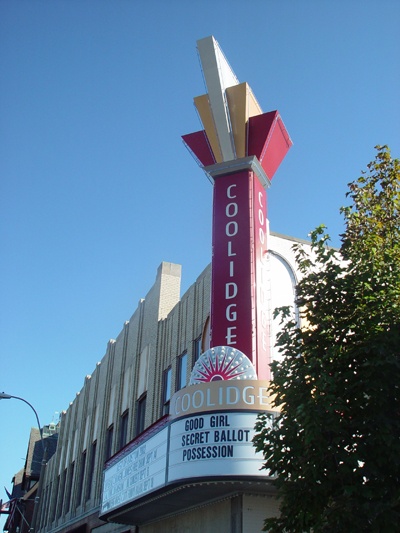2008 Coolidge Award Goes To British Producer
Jeremy Thomas Honored for Lifetime Achievement
By: Mark Favermann - Apr 28, 2008
This year the fifth annual Coolidge Award recognized and honored eminent British film producer, Jeremy Thomas. Few people know what a producer actually does. A producer creates the conditions for making films. If the director is the CEO, the producer is the overall facilitator, the financier, the production coordinator, the production supervisor, and the film's COO or controller.The Coolidge Award recognizes one distinguished moviemaker annually whose work "advances the spirit of original and challenging cinema." Starting in 2004, The Coolidge Corner Theatre Foundation has awarded the prize (including $10,000) to director Zhang Yimou (Hero, The House of Flying Daggers, Raise the Red Lantern), cinematographer Vittorio Storaro (The Conformist, 1900, Last Tango in Paris, One From the Heart, Tango and Bulworth), great actress Meryl Streep and Martin Scorcese's primary film editor Thelma Schoonmaker (Raging Bull, The Aviator and The Departed).
Jeremy Thomas is perhaps the least known of the winners, however his impact on contemporary filmmaking is both long and deep dating back over thirty years. His work has included collaborations with such acclaimed directors as Bernardo Bertolucci (The Last Emperor, The Sheltering Sky, Little Buddha), Nicolas Roeg (Insignificance, Bad Timing, Eureka), David Cronenberg (Naked Lunch, Crash) and Terry Gilliam (Tideland). In 1998, Thomas himself directed All The Little Animals, starring John Hurt and a very young Christian Bale. With Jonathan Glazer, he produced Sexy Beast staring Sir Ben Kingsley and Ian McShane.
Starting out first as a film editor, over the last three decades or so, Mr. Thomas has taken on cinematic projects that he liked rather than ones that he sought out because of their profit potential. He has been and is a truly independent film producer of style, quirkiness and grace. Musically gifted, his choices for film score music have been wonderful in each of his productions. The mythic film, Merry Christmas, Mr. Lawrence by Director Nagisha Oshima and starring David Bowie as a Christ-like character in a Japanese prisoner of war camp exemplifies this. Thomas is known as an actor's producer as well.
Jeremy Thomas comes from a filmmaking family in London. His father Ralph was a director and his Uncle Gerald was as well. Surrounded by film craft and actors as a child, he always wanted to be involved in the world of the cinema. His son is now beginning to work in film as well continuing the cinema dynastic tradition. As soon as he left school he went to work in various studio positions, ending up editing on films such as The Harder They Come, Family Life and The Golden Voyage of Sinbad. Quickly, he worked his way up the ranks to become a film editor for Ken Loach on A Misfortune. After editing the documentary Philippe Mora's Brother Can You Spare a Dime in New York, he produced his first film, Mad Dog Morgan in 1974 in Australia. He then returned to England to produce Jerzy Skolimowski's The Shout, which won the Grand Prix de Jury at the Cannes Film Festival.
Thomas' films are all highly individual. His particular independence of spirit has sometimes paid off both artistically and commercially. In 1986, he produced Bernardo Bertolucci's Chinese epic, The Last Emperor, an independently financed project that was three years in the making. A commercial and critical triumph, the film swept the 1987 Academy Awards, winning nine Oscars including Best Picture.
Others of his recent credits include, Takeshi Kitano's Brother, Khyentse Norbu's The Cup, Phillip Noyce's Rabbit-Proof Fence, David Mackenzie's film of Alexander Trocchi's Young Adam, Bernardo Bertoluccii's The Dreamers, Terry Gilliam's Tideland, Wim Wenders' Don't Come Knocking and Richard Linklater's Fast Food Nation. Many of these are minor masterpieces.
Mr. Thomas was Chairman of the British Film Institute from August 1992 until December 1997 and has been the recipient of many awards throughout the world, These include the Michael Balcon British Academy Achievement and the European Achievement in World Cinema, Prix Screen International and the European Film Award in 2006. He has also been President of the jury at Tokyo, San Sebastian, Berlin Film Festivals and has also served on the main jury at Cannes. Not surprisingly, he was made a Life Fellow of the British Film Institute in 2000.
The main awards ceremony on Wednesday evening, April 16, interspersed personal tributes with film clips of his cinematic accomplishments. Celebrity guests included distinguished director Nicolas Roeg, Academy-award winning screenwriter Julien Temple, American actress Debra Winger, and British bad-boy character actor Tim Roth. They all paid tribute to Mr. Thomas with often witty and sometimes brilliant testimonials and film introductions.
On the afternoon of April 17, Mr. Thomas personally presented film clips from a few of his favorite films with commentary. The audience was invited to ask questions about the art of producing film. That evening there was a panel discussion that looked at the dynamics of producing a film. The panel included guests Nicolas Roeg, Julien Temple, Debra Winger and Tim Roth. This discussion was moderated by Professor J.D. Connor, The Director of Undergraduate Film Studies at Harvard University.
Though not attended in the same numbers as previous other Coolidge Awards ceremony presentations, most who were there agreed that the 2008 edition just might have been the most substantive and of highest quality of all in terms of cinematic discussion and depth of topics.
The Coolidge Corner Theatre is New England's most successful independent, not-for-profit cinema. Built as a church in 1906, it was redesigned as an Art Deco movie palace in 1933. Located in Brookline, Massachusetts, since 1988 it has been a non-profit foundation. The Coolidge celebrates the experience of cinema by presenting the finest international, documentary, animated, and independent film selections and series. There have been many changes to the Coolidge in recent years. These have greatly changed the perception of the Theatre in the eyes of the public. The Coolidge has experienced a renaissance, transforming itself from a dowdy, run-down but beloved experimental art house to a stable, prosperous, and highly valued institution in the community.
The primary mission of the Coolidge Corner Theatre Foundation is "to entertain, enlighten, and engage -- building community through film culture." The core of its programming is cinema, and the goal is to show films, as they were meant to be seen, on the last giant silver screen in Boston. With annual attendance of 200,000, the Coolidge serves a diverse community audience. As a culturally significant institution, it has dramatically increased awareness of American and world cinema. In recent years, the Coolidge has received numerous awards and commendations.
The Coolidge Awards is just one of the special programs that the Coolidge Corner Theatre has instituted. The Coolidge Corner Theatre is a cultural institutional gem.


